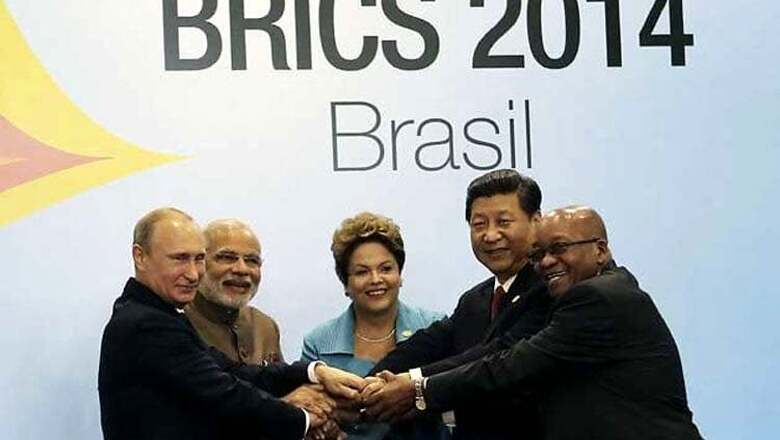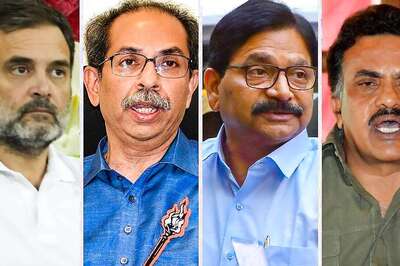
views
New Delhi: At a BRICS Civil Forum, Network 18's Foreign Affairs Editor Anchal Vohra shares her views on BRICS: Construction of a multipolar world, 'Peace and Security'.
BRICS is the acronym for an association of five major emerging national economies: Brazil, Russia, India, China and South Africa. The grouping was originally known as "BRIC" before the inclusion of South Africa in 2010.
Here is the list of the suggestions she made at the event.
What is BRICS? What is the multipolar world that we want? These are the 2 most important questions that we need to address.
Is BRICS just an acronym?
The way all delegations sang together and encouraged others to join them, was a tiny glimpse of what it could be. BRICS is certainly about emerging economies. It is unique because it is pan continental.
Is it a counter to America-led largely uni polar world?
A multipolar world is a welcome idea even in countries like the US. A 2012 Pew Center Research survey found that about three-quarters (74%) of the public favor a shared leadership role for the US; 9% say the US should be the single world leader, while 12% say it should have no leadership role at all.
In a paper written by an American academic Mihaela Papa, Ph.D in her research paper 'Pursuit of Multipolarity' she attempts to find out the impact on US policy. She says, "Brics challenges US officials to clarify their message on multipolarity; it reframes the debate from bilateral China vs US competition to multilateral processes of providing global public goods."
Others say, "There's no reason whatsoever to expect them to agree on anything substantive in the world, except that the existing dominating powers should cede some of their influence and power."
We have to accept it as a challenge. It is true that BRICS nations compete and their national interests do not always allign. We also have different sets of values.
The matter of discussion then is that how can our national interests merge with our values.
So we need commons. Common goals and common values that serve our national interest. An alliance of convenience based on when it suits us is not a sustainable idea.
The common principles are that violation of other countries' sovereignty should not be compromised. Climate change is also an area of cooperation giving voice to millions on an international stage. Terror cooperation and economic cooperation are also the common principles.
Russia President Vladimir Putin said, "At the top of BRICS agenda is creation of a more balanced and just system of global economic relations."
The national development bank is a start and would be useful for developing countries to fund infrastructure. This is one area where our national interests and values merge.
The other is equality. Voice of the 40% of the world want them to be heard on global platforms. Despite the size of our land mass or economies, we want to harness immense talent and live as equals.
In that context from an Indian perspective, UNSC reforms are crucial.
If Russia and China have the veto power why shouldn't India get a UNSC seat?
China has said that it welcomes greater role for India at the UN but doesn't endorse its bid at the UNSC. The move doesn't sound like an equal for Indians.
Thus in the recommendations, we strongly feel that UNSC should be priority for India.
Terror cooperation is a common goal.
China, Russia, India are all victims of terror like several other parts of the world. In Syria, the change in America's approach may be more reflective of events that are taking place in the war-torn country. However, it proves that to a large extent, the analysis of the BRICS countries was accurate. But there is a problem in Syria, Libya, Iraq, Afghanistan.
In the last joint statement, the word terror or terrorism has been used 9 times and extremism thrice.
While one can argue that isn't much, it has been discussed. When we speak of Iraq, Syria, Afghanistan, we speak of terror. It shouldn't be just about a power game.
In 1996, India had tabled a draft resolution in the UN on the Comprehensive Convention on Terrorism. It stresses on dismantling terror infrastructure. It stresses on the need "to bring to justice perpetrators, organisers, financiers and sponsors" of terror.
After the recent RIC summit, India's External Affairs Minister was jubilant as both Russia and China supported India's proposal to revive negotiations at the United Nations (UN) on the Comprehensive Convention on International Terrorism.
In reality, China blocked resolution most countries like the US, Germany, France were ready to pass.
It is morally wrong to differentiate between terrorists. There can be no good or bad terrorists. While the ETIM troubles China, Lashkar-e-Toiba and other groups supported by Pakistan trouble India. Al-qaeda brought the twin towers down and IS is a menace for some and could be for many others.
So first, let us define terror and terrorists. I recently interviewed General Pervez Musharraf, the former army chief and president of Pakistan. In the interview he categorically said, "One country's terrorist is another's freedom fighter." According to him, people like Hafiz Saeed and Lakhvi, who have been banned by the UN, are freedom fighters.
If BRICS wants to promote multi polarity, it should go beyond economic cooperation and have common goals. Terror can't be a partial goal and all BRICS countries should stand up against terrorists without exception.
What else can we do in this space? Intelligence sharing. For example in Afghanistan, terrorists have started cashing in on the brand ISIS.
As he visited India, I asked Ashraf Ghani, why the theatre of war has been shifted from the south to the north. He said the terrorists are aiming at China like the ETIM. The east Turkmenistan islamist movement is also taking shelter in Pakistan and is roaming around in the AFPAK area.
If the situation gets worse, India could be badly impacted. In the past, terror groups targeting India had camps in Afghanistan.
Second recommendation: BRICS should embrace Comprehensive Convention on International Terrorism.
Human Rights
In the last joint statement, human rights is mentioned 10 times and equal rights of all countries once. This is a common area of criticism.
As BRICS talks about violation of human rights in Libya, Syria its own human rights are under question. The two-day symposium on "Building BRICS: Human Rights in Today's Emerging Economic Power," in February 14-15, 2013, examined the human rights records in the BRICS countries such as race relations in Brazil, freedom of expression in Russia, minority religious and language rights in China, women's rights in India, and LGBT rights in South Africa.
In the future, visits of successful women should be oorganized for a successful future. A dialogue on Minority rights, Freedom of speech should be initiated.
Third recommendation is to form a gender forum, a human rights forum which can come under civil BRICS.
In the end, I would like to talk about the aspirations of Indians, Brazilians, the Chinese, the Russians, the Africans. Before arriving in Moscow, I asked atleast 20 people what is BRICS, and they all said it's a group of countries with nothing in common.
Beyonce and Madonna are a part of our daily lives and elections in the UK are covered extensively in the Indian press. I do feel closer to or have more in common with an American or a even a german than a Russian or a Chinese.
Language is a barrier. At one of the prime language schools, 10 students are learning Portuguese, 15 are learning Russian and 300 Mandarin but all the BRICS nations need to think of language cooperation.
My fourth and final recommendation is: A BRICS Club in all BRICS countries which could be organized by the embassies. We can have a Tolstoy book reading session in Russia's embassy in Delhi, Chinese opera or Bollywood movies in South Africa.
The BRICS clubs could be an intellectual hub, the unpaid think tanks.



















Comments
0 comment